PR Agency Admits Dirty Tricks for Facebook
Instead of talking about how good it is, Facebook hired a big PR agency to plant negative stories about Google. The story is being reported by the San Jose Mercury News. The agency in question is a big one: Burson-Marsteller. And the company is now very embarrassed.
Facebook, which has had some serious problems of its own with privacy issues wanted Burson-Marsteller to plant stories that attacked Google for violating the privacy of Facebook users. In other words, "Excuse me, Kettle, you have a call from Pot on line 2."
According to the Mercury News report, Burson-Marsteller said that it had undertaken an assignment for Facebook. The PR giant, engaging in a crisis-management program on its own behalf, then characterized the assignment as something that "was not standard procedure".
Burson-Marsteller also said that it should never have accepted the assignment.
Google refused to talk about the issue.
The Mercury News account quoted Santa Clara University law professor Eric Goldman: "It's like Donkey Kong between Facebook and Google, seeking victory by any means." Goldman continued, "I'm a little perplexed about why Facebook decided to try and stir the pot through a PR agency. If they wanted to call out Google, then call them out publicly."
Dumb and Dumber Meet the Three Stooges
The Mercury News account amusingly reveals how the plot became public knowledge.
Reporter Patrick May says that Burson-Marsteller's John Mercurio sent an e-mail to blogger Christopher Soghoian suggesting that he write an op-ed piece about Google's "well-known history of infringing on the privacy rights of America's Internet users."
Soghoian is a former Federal Trade Commission researcher and he asked Mercurio who he was working for. Mercurio demurred. As any PR professional should know, that's not a wise thing to do when a reporter starts asking questions.
"Smelling something fishy," reporter May wrote, "Soghoian posted the full e-mail text of Mercurio's pitch -- along with his rejection -- on the Internet."
As for Facebook, May quoted a company statement: "The issues are serious and we should have presented them in a serious and transparent way."
What's This All About
Money. What else?
Both Facebook and Google make money through online advertising.
As a Facebook user, I'm going to interject this personal note: Facebook ads are often for misleading products and services. The political ads that Facebook shows me are rarely for politicians or causes that I support. I find Facebook ads to be uncommonly annoying and this is one reason that I spend little time on Facebook.
And now, back to the story.
The Mercury News says: "With its 600 million members, Facebook is increasingly exploiting its treasure trove of personal user data by targeting ads, putting it in conflict with the Mountain View-based search giant."
Google co-founder and current CEO Larry Page has told staffers that social networking is something that Google plans to expand aggressively. That apparently made Facebook's Mark Zuckerberg (or someone who reports to him) very nervous and the company did something supremely stupid.
Reporter May quoted Roger Kay, an analyst with Endpoint Technologies: "This shows the world that Facebook is really focused on Google as its main competitor, which many people might not have fully realized. The nightmare scenario for Facebook is that all the data they've gathered and stored about their members over time could now be threatened by Google."
It'll be interesting to see what's next as this story plays out.
Oh, Look! I Won Another £1,000,000!
I must have been in a surly mood when the message arrived. Coca-Cola UK was going to give me one million pounds, the message said. The first (and most obvious) question is why a company in the UK would give its top prize to someone in the US. But let's see what other obvious idiocies the fraudsters thought I wouldn't notice.
 The message was a typical fraud but I haven't dissected one of these for a while and some of the people seem to enjoy these. So here goes ....
The message was a typical fraud but I haven't dissected one of these for a while and some of the people seem to enjoy these. So here goes ....
- The morons couldn't even bother to forge the from address. The message came from:
COCA-COLA UK <mycokeclaim2011.uk82@rocketmail.com>. Yeah, a large company such as Coca-Cola would use a Rocketmail address! - There were no "to" addresses and the CC line showed "recipientlistnotshown". Excuse me a moment while I suspend disbelief and think that tens or hundreds or thousands of people have each won one million pounds and that the company that is awarding the prize can't be bothered to send individual messages.
- My anti-spam software considers this message to be spam.
- London is 4 hours ahead of the US Eastern Time zone but this message claims to have been sent from a location that's 8 time zones ahead of GMT. What countries are located in GMT+8? Brunei; parts of China (including Hong Kong); Bali, Nusa Tenggara, South & East Kalimantan, and Sulawesi (all in Indonesia); Malaysia; Mongolia; Philippines; Singapore; and Taiwan. So this is where Coca-Cola UK is headquartered?
- The message starts with a "batch ref" of "/2011/YY," Why is the year followed by "YY"?
- Well, maybe the prize could be awarded outside the UK, but (referring to my e-mail address): "This numbers fall within the USA (Maryland) Location file, you are requested to contact our fiduciary agent in USA (Barrister. Peter) with the details below and send your winning information to him by E-Mail." But I seem to live in Ohio and have never even visited Maryland. (And of course anyone who knows anything about the UK judicial system would know that a "barrister" wouldn't be involved in settling a lottery claim.)
 The message claims to be from "1 Queen Caroline Street, Hammersmith, London W6 9HQ, United Kingdom". This is what's there.
The message claims to be from "1 Queen Caroline Street, Hammersmith, London W6 9HQ, United Kingdom". This is what's there.
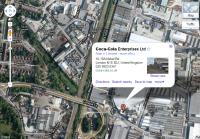 Coca-Cola Enterprises Ltd, however, is located at 10-10A Nobel Rd, London N18 3DJ, United Kingdom.
Coca-Cola Enterprises Ltd, however, is located at 10-10A Nobel Rd, London N18 3DJ, United Kingdom.
And the message really came from Yahoo (Received: from [98.139.212.222] by tm3.bullet.mail.bf1.yahoo.com with NNFMP; 13 May 2011 22:49:55 -0000)
so some poor slob had his (or her) e-mail account compromised by a bunch of thieves.
 Oh ... and the "barrister"? I should contact him at "barr.peter@gvvra.com". I found that gvvra.com is administered by "Frank Johnston" who supposedly lives in Atlanta even though the domain name was registered through an Australian registrar. Atlanta. Hmmm. That's Coca-Cola's corporate headquarters so maybe the crooks are getting smarter. But the address is for a residential area (shown at right).
Oh ... and the "barrister"? I should contact him at "barr.peter@gvvra.com". I found that gvvra.com is administered by "Frank Johnston" who supposedly lives in Atlanta even though the domain name was registered through an Australian registrar. Atlanta. Hmmm. That's Coca-Cola's corporate headquarters so maybe the crooks are getting smarter. But the address is for a residential area (shown at right).
The domain gvvra.com (created just last October) is for the "Global View Visa Recruitment Agency", which claims to be headquartered in Maryland and have offices in West Africa and China. According to scamwarners.com, fraudwatchers.org, and other anti-fraud sites, the company runs an employment agency scam that offers $75/hour jobs (or $35/hour for unskilled workers) in developing countries.
The further I dig, the stronger the smell. I won't be applying for the "£1,000,000" that I've "won". Gah! And people fall for these tricks!
And Then There Were Five
In the late 1990s, you had a choice of browsers. Netscape was the leader but Microsoft released the first Internet Explorer in 1995. Over the years, browsers such as Cello, IBM's Web Explorer, Konqueror, Sea Monkey, Opera, and others arrived. Some stayed. Most departed. Netscape and IE were left. Then came Firefox. Netscape died. Google released Chrome. Apple reworked Konqueror as Safari. And today, instead of 2 browsers, there are 5 contenders.
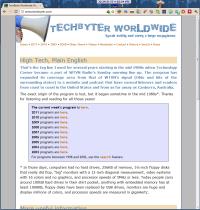 Google Chrome
Google Chrome
This isn't my favorite browser but it is my default browser. If that causes you to say "What!?" I understand. Chrome is fast so it's the browser I'd like to use when I click a link but there are some compatibility issues (aka "problems") with Chrome so it's not the browser that I use for most of the websites I need to use each day.
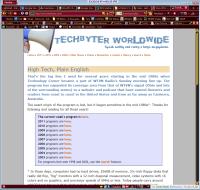 Mozilla Firefox
Mozilla Firefox
Because Firefox has thousands of add-ons, it's the browser that I use most of the time. But Firefox checks for a new version of the browser and updates for all of its add-ons every time it starts up. As a result, start-ups can take an astonishingly long time.
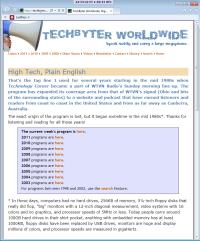 Microsoft Internet Explorer
Microsoft Internet Explorer
Because Internet Explorer is made by Microsoft, it integrates fully with the operating system (Windows 7 only). As a result, you can pin websites to the task bar. A single click opens the browser and the site.
This feature alone is not enough for me to use IE as my primary or secondary browser but it's a good example of how Microsoft can provide useful features when applications are integrated with the OS. Each pinned site has its own Jump List and, depending on the site, you might have the option to include live status information as an icon overlay.
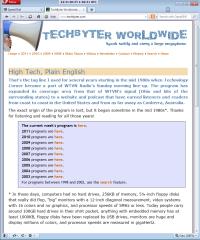 Opera
Opera
The Norwegian developers who created Opera have always believed in standards, something that Netscape and Microsoft often gave lip service to but with the underlying emphasis on "we set the standards and everyone else must follow our standards". That led Microsoft to create "standards" and Netscape to create "standards". Opera believes in following the W3C's standard standards.
That emphasis on standards has continued but Opera has never managed to exceed more than single-digit market penetration.
 Apple Safari
Apple Safari
Safari includes a "reader" function that removes what Apple calls "annoying ads and other visual distractions" from online articles. Essentially this is just a text view that eliminates graphics so you see the text from an article and nothing else. This could be a problem for highly visual websites, but it's a welcome feature for those sites that pop ads over the article you're trying to read or insist on displaying animated ads. Click the Reader icon and the article appears in a single continuous, clutter-free view.
Short Circuits
We Don't Need No Steenkin' Gatekeepers!
In the old days, media "gatekeepers" controlled the flow of news and this was a bad, evil thing. Or was it? Back then there was an effort to provide a fair and balanced view of things, not just to call your coverage "fair and balanced". If you were a bleeding-heart liberal, you couldn't entirely avoid the conservative viewpoint. If you were a conservative, you would find the views of liberals in the presentation.
On the Internet, there are no gatekeepers. At least that's the conventional wisdom. Or maybe it's that we are our own gatekeepers. Is this good or is this bad? We can choose our own news: Liberals will view reports from MoveOn.org. Conservatives will view reports from FoxNews.com. Maybe that's OK because they know they're limiting their exposure to viewpoints that match their world view.
But what about those of us who just use Facebook or Google and think that we're seeing a representative view of the world? Progressives, such as MoveOn's Eli Parisier, worry about these kinds of things. He wondered what happened when his conservative friends on Facebook started disappearing and he's written a book called The Filter Bubble that explains the problem.
Parisier also created a presentation for TED. It's well worth the 9 minutes you will need to view it. Please do take a look:
The Sony PlayStation Network is Back (More or Less)
Sony has partially restored the PlayStation Network and Qriocity. The systems were shut down a month ago following a security breach. Online games are back. So is the music service and the chat service. All other services remain unavailable and all services remain off-line for Asia.
Sony says that personal data (names, profiles, addresses, and credit card details) may have been accessed for more than 100 million users. Sony had expected its network to be operational again on May 7th but was unable to meet that date. The new target date for all services in all regions is the end of the month.
According to the Bloomberg News Service, Sony hired a new chief information security officer and has increased the number of firewalls between servers. New software is also in place to provide advance warning of intrusions.
Sony will give all users free identity theft protection and insurance for one year, two free PS3 games, and a free one-month subscription to PlayStation Plus.
Porn Stars Sometimes Write Books
A news release that I received this week promoted a book by Oriana Small, who is also known as Ashley Blue. Small/Blue is described as "a writer and visual artist from Southern California. As Ashley Blue, she appeared in over 300 adult films, directed 17 adult film features, co-hosted Playboy TV's Night Calls Hotline, and has won numerous adult film industry awards, including AVN's Female Performer of the Year in 2004 and Best Supporting Actress in 2005. She lives and works with her husband, photographer Dave Naz, and her cat and dog in the Hollywood Hills." OK. She's a cat person so I have to follow this lead.
This may be an unpopular point of view: Pornography is a fact of life. Whether you consider it good, indifferent, or bad doesn't matter. If you're an adult, are you allowed too determine how you want to use your body? That probably doesn't matter either. But this fact is obvious: Pornography has been with us since people who lived in caves realized that they could create "stimulating" images on the walls of those caves.
- Painters created pornography.
- Photographers created pornography.
- Videographers created pornography.
- The Web is a haven for pornography.
There is no artistic medium that has not been used for pornography, so maybe we should just accept it as a fact of life and not suggest that it will be the downfall of civilization.
Of the book, one reviewer wrote "Girlvert: A Porno Memoir is not well-written. But it is good. It’s very good. Oriana Small is not a writer, she’s a porn star, and for the most part, her account of working her way up the pornography ladder throughout her twenties reads, at least technically, like a high schooler’s diary: in turns sentimental, solipsistic, blithely ignorant. She makes all the hallmark mistakes of a young writer (redundancy, passive voice, overwrought metaphors), in addition to dropping some truly bad sentences."
So if this is your kind of entertainment, you'll find the book (or maybe you already have). If this is not your kind of entertainment, you may consider mentioning it an example of my depravity.
But let's go back for a moment to another reviewer's comment: "I found myself wishing Girlvert was fiction so that I could rightly lament the lack of sufficient payoff in the end. Small does indeed achieve some major personal triumphs near the book’s close. We’re thrilled when she says, “Most importantly, I wasn’t seeking the approval that I used to so desperately need from a variety of men or those who watched [my movies]."
If you're interested in learning more, allow Google to be your friend.
"Generous" Caps May Not Be So Generous
Comcast and AT&T don't like competition so they've started placing what they term "generous" bandwidth caps around 200GB per month on subscribers. That's 6GB per day, so it seems like enough, doesn't it? If you stream video using your Internet connection, it might not be so generous.
AT&T has joined the cap club and says it will affect just 2% of its users. Today.
Netflix, for example, is responsible for about one third of what's termed "peak bandwidth usage" and the average user currently streams about 40GB of video per month from the service. That's for people who use their PCs to view videos.
If you're an Xbox 360 user who views videos, the average is 80GB per month. And if you stream radio programs, music, or other data from other sources, it's clear that these "generous" caps will sooner or later begin to affect your service and not in a good way.


 The author's image: It's that photo over at the right. This explains why TechByter Worldwide was never on television, doesn't it?
The author's image: It's that photo over at the right. This explains why TechByter Worldwide was never on television, doesn't it?
